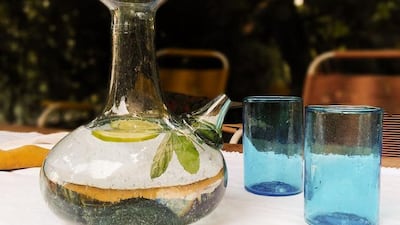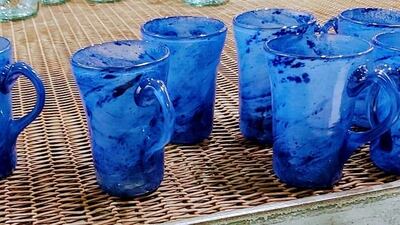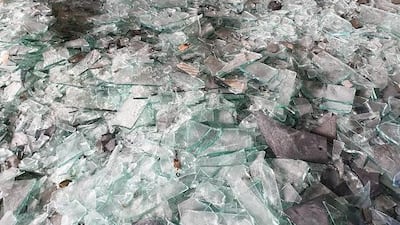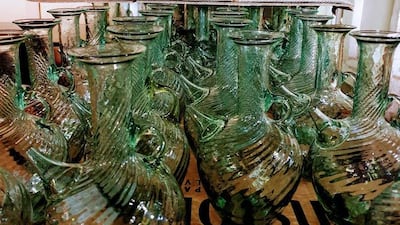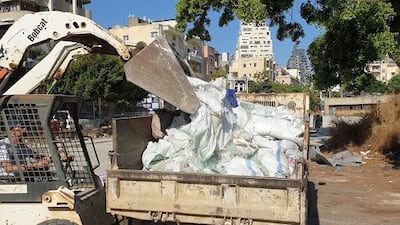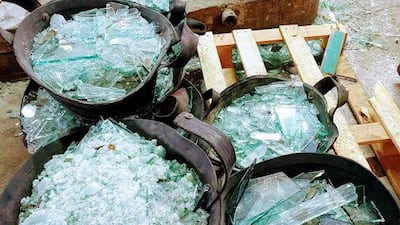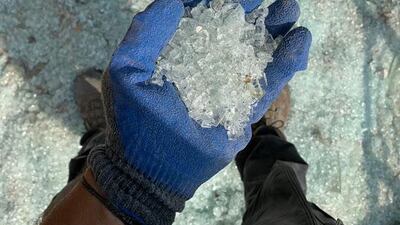A Lebanese industrial engineer is leading an initiative to transform shattered glass left in the wake of the Beirut blast into beautiful and affordable glassware.
Along with a group of volunteers, Ziad Abi Chaker has saved more than 100 tonnes of shards from landfill sites in Lebanon, a country that is facing – besides economic hardship – an ongoing rubbish disposal crisis.
Abi Chaker's initiative is transporting the shattered glass to factories in Tripoli, in the north of Lebanon, where it is melted down and reshaped into long-stemmed carafes, traditional ibriks and coffee mugs.
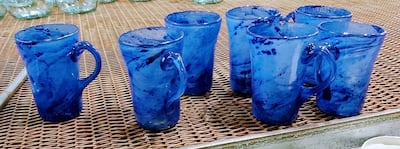
Abi Chaker was in the Badaro area, a stone's throw from Beirut port, when the explosion shook the Lebanese capital on August 4.
"I heard the blast when it happened. I heard the glass shattering. I heard the bang. I heard people yelling and everything," he tells The National, recounting how he went outside to find the neighbourhood had been blanketed by debris and shattered glass.
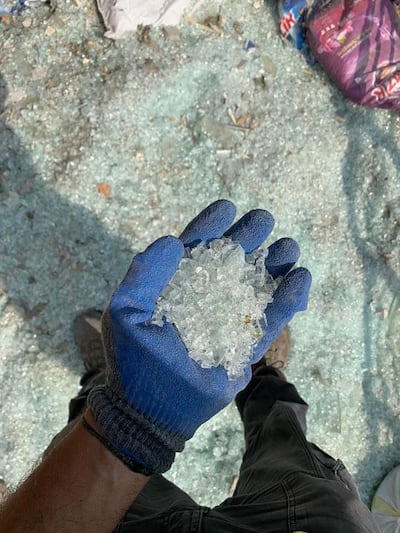
“We were all shook up. It was a blast that we had never seen before, even by Beirut standards,” he says.
Two days after the explosion, Abi Chaker, who has spearheaded several recycling initiatives in Lebanon since 2010 – accomplishments that have earned him the epithet "The Garbage King of Beirut" – was contacted by the NGO Muwatin Lebnene (Lebanese Citizen) for his opinion on what to do with the glass.
"I worked with them during the revolution [of 2019] doing waste management at Martyrs' Square," he says. "After they called me, I went to meet with them at the base camp they had set up in Mar Mikhael, and we started discussing what to do with all the glass."
The explosion, Abi Chaker says, shattered about 5,000 tonnes of windowpane in and around Beirut. "We could not let all this glass end up in our already overflowing landfill sites," he says.
After meeting with NGOs conducting clean-up operations in the blast-affected areas, Abi Chaker took some samples of the shattered glass to factories in Tripoli to see if they could make use of it.
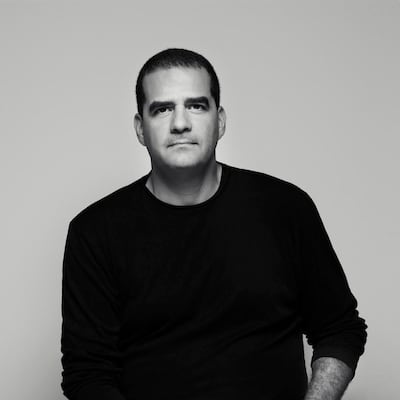
"The idea was to provide raw materials for our struggling glass-making factories. We could only make use of the glass that had fallen inside people's homes," he says. "That which had fallen out in the street and had mixed with sand and debris could not go into the ovens at the glass factories."
The reason for this, Abi Chaker explains, is that any impurity in the glass would make the final product more fragile. A stress point develops around the impurity, so even "if you tap it with your finger, the glass would break".
There is an aesthetic consideration, too. "People don't want their jugs, where they put their oil and water, to have an impurity."
Days after the blast, Abi Chaker began a social media campaign, calling on residents in affected neighbourhoods to collect the shattered glass that had spilled into their homes and, after packaging it in boxes or plastic bags, send a location pin through WhatsApp for pick-up to be arranged.
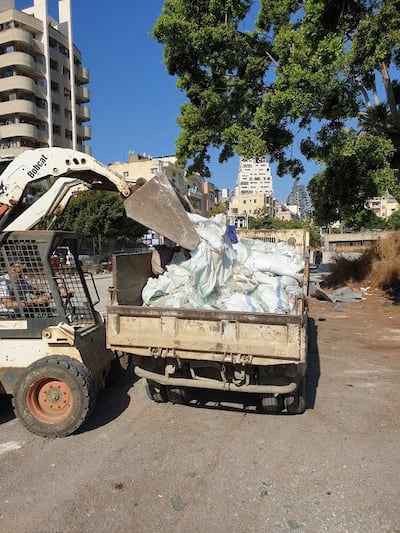
“We called on volunteers to help us,” he says. “Muwatin Lebnene covered the expense of sending pick-ups door to door within Beirut and bringing the glass back to the base camp in Mar Mikhael. It was up to me to get the funding to cover the cost of sending the trucks from Beirut to Tripoli, so we organised a fundraiser to help us collect the necessary amount.”
By August 15, less than two weeks after the blast, the initiative had managed to collect more than 10 tonnes of shattered glass, giving the two factories in Tripoli "enough free raw materials to produce for three days", Abi Chaker wrote on his Facebook page.
However, as the glass was sent to the factories, the initiative encountered another hurdle. Even the glass that was collected from within households was not clean enough to be processed directly.
"To overcome that obstacle, we offered to hire two people for the factories, to inspect the glass before it was put into the ovens. Thankfully, we had raised enough funds to be able to afford it."
Abi Chaker says even with the influx of free raw materials to boost production, the two factories were still finding it difficult to survive.
"Our industries in Lebanon are really struggling," he says. "Like really, really struggling. I went to visit the factories sometime around the end of August and the two owners, in two separate conversations, told me: 'We need to work. We need to sell more. We need new markets.' And that is when I took a personal initiative to use my own money, not the fundraising money, to help."
Part of what inspired Abi Chaker to invest his own money in the project, he says, was his experience with the Green Glass Recycling Initiative Lebanon, which he founded in 2013. It aimed to provide a recycling outlet for green glass bottles after the Maliban recycling factory – the only manufacturing plant in Lebanon that specialised in recycling green, clear and amber glass – was destroyed during the July 2006 conflict.
"The Maliban factory was never replaced," Abi Chaker told online publication Wamda in 2015. "The foreign company that owned it was not compensated by the government for their loss, and to rebuild would have been about $40 million investment. So, it wasn't worth it for them. From that point on, the bottles grew in number."
In its first year, the GGRIL recycled about 200 tonnes (more than 650,000 bottles) of green glass, turning the raw material, with the help of a family of glassblowers in the south of Lebanon, into lamps, vases and drinking glasses.
At its core, GGRIL, which is still in operation, is at once a recycling project and an infrastructure designed to help boost the operations of the diminishing glassblowers' industry within Lebanon.
Before GGIRL, they were facing bankruptcy and the demise of their ancient art, and Abi Chaker says he brought that approach to the shattered glass initiative with the aim of bolstering business for factories long-term.
"I sat down with the owners of both factories and we drew a few designs," he says. "I then gave each factory an order of 5m Lebanese liras [$3,300]. The plan was to make the glassware and see how it would fare in the market before reinvesting all the profits back into the factories."
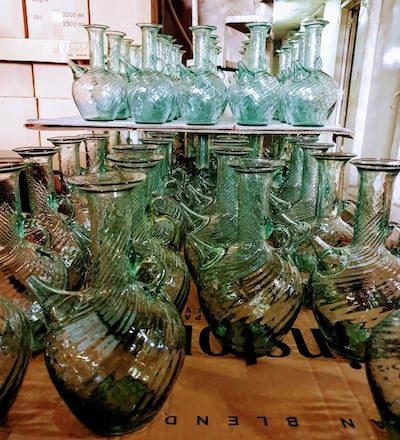
It didn't take long for the orders to start pouring in once the products went up for sale on the GGRIL website in September. The glassware includes jars, carafes, coffee mugs and ibriks, as well as large, 2.25 litre bottles.
“People really embraced it. I really wasn’t expecting people to engage with the initiative this much. The orders were so overwhelming, we had to block off new orders for a few weeks just to keep up.”
The symbolism of the glassware, Abi Chaker says, contributed to its popularity. That out of the destruction, something else could be created. Something durable and beautiful.
Abi Chaker laments that his initiativecould have collected a lot more glass if the municipality had collaborated with them. "We could have easily collected 300 tonnes," he says. "You know they're not used to this kind of stuff. They don't have the competence to deal with an issue like this. When you have a crisis and there's incompetence at the helm, it hurts."
More information on the initiative and glassware is available at ggril.org
